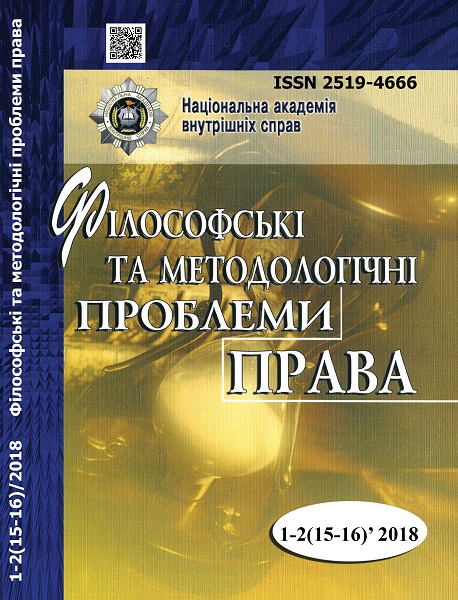Methodological Peculiarities of the Study of the History of Legal Regulation of the Administrative-Territorial Structure of Ukraine
Abstract
Since the proclamation of independence in Ukraine, reforms have taken place. However, their process has now intensified. An important reform is the reform of the administrative-territorial unit of Ukraine. One of the reasons for its non-implementation is the lack of a solid scientific concept, and also the failure to take historical experience into account. In the conditions of aggression of the Russian Federation against Ukraine, the reception of historical experience now has not only praxical but also ideological significance. The Russian Federation seeks to prove that there was no Ukrainian statehood, and Ukraine should demonstrate its succession since the times of the Ukrainian Peopleʼs Republic. In the course of the reform of the administrative-territorial unit it would be advisable to borrow the terms used to designate administrative-territorial units in the Ukrainian Peopleʼs Republic. Since both in the period of the Ukrainian Peopleʼs Republic and now, in Ukraine, the system of administrative-territorial arrangement consists of 3 units. Polymetology was used in the process of studying the history of legal regulation of the administrative-territorial unit. As we are advocates of a realistic school of law and oppose classical normality. The peculiarity of historical and legal research is that in them the prevailing is the descriptive method. In addition, we believe that the historian of law should study not only the legal acts, but also take into account economic, political and other aspects.
In our study, we are talking about the need to secure evolutionary changes in society, so we used a sociological approach. Particular attention is paid to the psychological approach in the article, because, as a rule, they are neglected when drafting reforms of the administrative-territorial unit. After all, the aim of the reform must be primarily to ensure the interests and comfort of citizens, to avoid social tensions and conflicts.
In the process of research, we used the methods typical of large-scale legal research: dialectic, systemic-functional, comparative, hermeneutical, formal-legal, statistical, modeling method. However, their content is not disclosed. The article concludes that in the study of the history of legal regulation of the administrative-territorial structure of Ukraine, the methodology is more functional than monometology.
Downloads
Abstract views: 211 PDF Downloads: 232
Copyright (c) 2019 Philosophical and Methodological Problems of Law

This work is licensed under a Creative Commons Attribution-NonCommercial-NoDerivatives 4.0 International License.
- Authors reserve the right to authorship of their own work and transfer to the magazine the right of the first publication of this work under the terms of the Creative Commons Attribution License, which allows other persons to freely distribute published work with mandatory reference to authors of the original work and the first publication of an article in this magazine.
- Authors have the right to enter into separate additional agreements on non-exclusive dissemination of the work in the form in which it was published in the journal (for example, to post an article in the institution's repository or to publish as part of a monograph), provided that the link to the first publication of the work in this journal is maintained.
- The journal's policy allows and encourages the posting of articles by authors on the Internet (for example, in electronic storehouses of institutions or on personal websites), both before the submission of this manuscript to the editorial office and during its editorial processing, as this contributes to the creation of a productive scientific discussion and positively affects the efficiency and dynamics of citing the published work.




